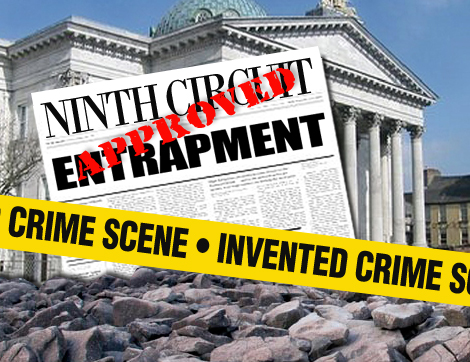
• Your hard-earned tax money being used by feds to set up citizens to commit crimes
By Keith Johnson
Federal law enforcement agencies will now find it much easier to frame gullible patsies for staged criminal acts thanks to a recent opinion by the United States Court of Appeals for the Ninth Circuit.
On October 23, a divided three judge panel in San Francisco upheld the drug conspiracy and weapons convictions of four men who were enticed, recruited and duped into participating in a government-scripted plot to rob a non-existent cocaine stash house in Phoenix , Arizona.
“Today our court gives our approval to the government tempting persons in the population at large currently engaged in innocent activity and leading them into the commission of a serious crime, which the government will then prosecute,” wrote sole dissenting Judge John T. Noonan, Jr.
The four men in question were arrested in 2009 as part of Operation Gideon, a “reverse sting” undercover operation set up by the Bureau of Alcohol, Tobacco, Firearms and Explosives (ATF). Using a paid confidential informant, the ATF trolled seedy Phoenix-area bars in search of would-be robbers. They eventually found a man named Shavor Simpson, who was asked by the informant if he would be “interested in putting a crew together” to rob a house that possibly had “some dope in it.”
After Simpson agreed to carry out the robbery, he was put in touch with an undercover ATF agent who, according to court documents, “proceeded to tell Simpson his cover story: He was a cocaine courier who transported drugs for a group of Mexican drug dealers and was unhappy with the pay he was receiving. He was interested in robbing the Mexican drug dealers as retribution for his low pay.”
Simpson originally intended to pull off the heist with only one accomplice but decided to recruit others after the agent warned that the two men might be outnumbered.
On the day of the planned robbery, a five man crew—armed with four loaded firearms—met with the ATF agent and followed him to a rented warehouse where they were arrested by federal agents. Four of the men were later convicted of conspiracy to possess cocaine with intent to distribute and use of a firearm in furtherance of drug trafficking. The former charge carries a mandatory sentence of ten years based on the quantity of fictitious cocaine the group hoped to steal.
Calling the ATF’s actions “disgraceful to the federal government,” Judge Noonan also argued that if U.S. “resources are deployed to fire the imaginations of dreamers of easy wealth and turn them to conspiring to commit a crime, our government has become the oppressor of its people.”
Unfortunately, the other two judges didn’t see it the same way. Though they acknowledged that the defendants were “responding to a government script,” the judges rejected the defense motion to dismiss because, in their opinion, “They were eager to commit the fictional stash house robbery, and they joined the conspiracy themselves without any great inducement or pressure from the government.”
Fictitious stings like these are more common than the public has been made aware. According to a recent USA Today investigation, “The ATF has more than quadrupled its use of such drug house operations since 2003…Yet the vast scale of that effort has so far remained unknown outside the U.S. Justice Department.”
Although USA Today identified more than 600 people prosecuted as a result of these controversial operations, they found that those targeted were already suspected of “ripping off drug dealers” by the ATF. What makes this most recent case unique, according to court documents, is that the “ATF was not infiltrating a suspected crew of home invasion robbers, or seducing persons known to have actually engaged in such criminal behavior. Rather, ATF found Simpson by ‘trolling for targets.’”
In ruling as they did, the Ninth Circuit has given law enforcement carte blanche to inspire and cultivate criminality in those who might not otherwise be inclined to commit unlawful acts. Anyone, regardless of their criminal history or lack thereof, could now become potential targets.
Impressionable youths are particularly vulnerable to this kind of entrapment. Earlier this year, it was revealed that the Federal Bureau of Investigation set up a bogus “jihad” website in hopes of luring wannabe “freedom fighters” into joining a Syrian terrorist organization. The romantic imagery and flowery language on the site managed to seduce one hapless Chicago-area teenager who was later arrested and charged with attempting to provide material support to a foreign terrorist organization.
Similar operations will no doubt flourish in light of the recent appellate court opnion. Political activists and American patriots should be wary of any charismatic figure that incites violence or offers easy access to weaponry. There’s a high probability that such individuals are actually government operatives who are simply trolling for targets.

Keith Johnson in an investigative journalist and creator of the Revolt of the Plebs.

